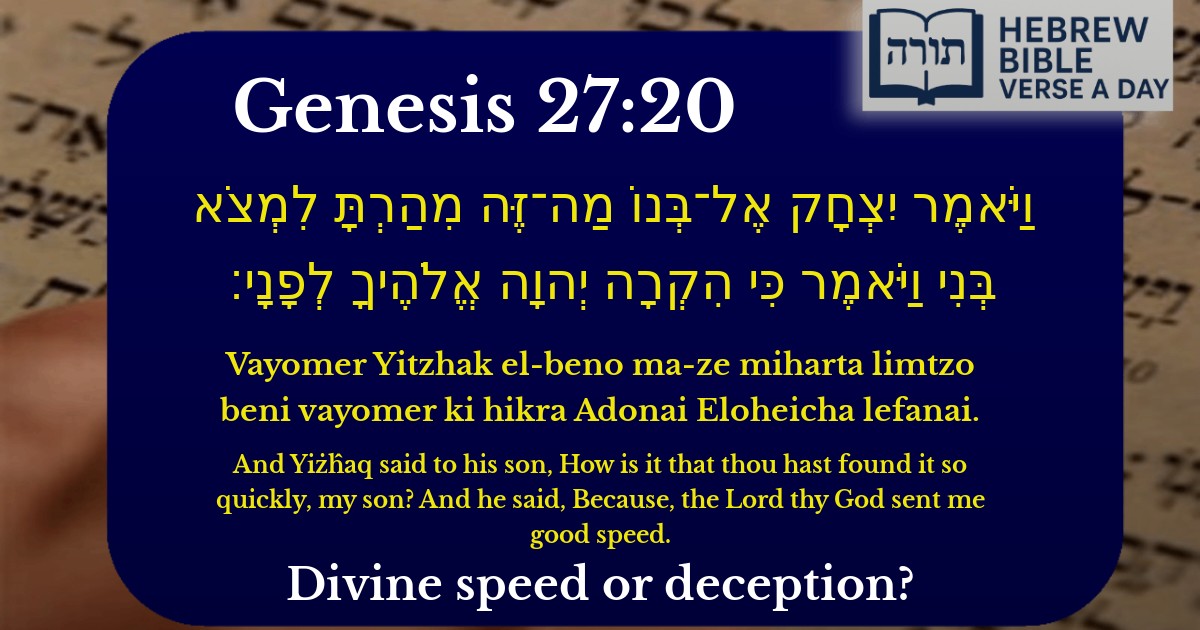Frequently Asked Questions
Q: What does Isaac mean when he asks, 'How is it that thou hast found it so quickly, my son?' in Genesis 27:20?
A: Isaac is expressing surprise that Jacob returned with the hunted game so quickly, as hunting typically takes time. Rashi explains that Isaac suspected something unusual, since Esau was known to be a skilled hunter but would not normally return this fast. This question sets the stage for Jacob's response about divine assistance.
Q: Why does Jacob say, 'Because the Lord thy God sent me good speed' in Genesis 27:20?
A: Jacob attributes his quick success to divine help ('הִקְרָה יְהוָה אֱלֹהֶיךָ לְפָנָי'). According to Ramban (Nachmanides), this was not a lie but a truthful statement—Hashem did orchestrate events so Jacob could receive the blessings. The Midrash (Bereishit Rabbah) also highlights that Jacob spoke carefully to avoid outright falsehood.
Q: What lesson can we learn from Jacob's response in Genesis 27:20?
A: The verse teaches the importance of recognizing Hashem's hand in our successes. Even when circumstances seem coincidental (like finding game quickly), Jacob acknowledges divine providence. The Talmud (Chullin 95b) discusses how righteous people attribute their achievements to G-d, a principle applicable in daily life.
Q: Why is Isaac referred to as 'your God' ('אֱלֹהֶיךָ') and not 'our God' in Jacob's reply?
A: Rashi explains that Jacob intentionally said 'your God' to imply that while Isaac had a close relationship with Hashem, Jacob felt unworthy at that moment due to the deception. Alternatively, the Kli Yakar suggests Jacob emphasized 'your God' to remind Isaac that the blessings were destined for him (Jacob) by divine will.
Q: How does this verse relate to the broader story of Jacob and Esau?
A: This moment is critical in the narrative of the stolen blessings. The Maharal (Gur Aryeh) notes that Jacob’s mention of divine intervention hints that the blessings rightfully belonged to him, as Hashem ensured his success. The verse underscores the theme of divine providence in the patriarchs' lives.


Context of the Verse
This verse (Bereshit 27:20) appears in the narrative where Yaakov, disguised as Esav, brings food to his father Yitzchak to receive the blessings intended for the firstborn. Yitzchak questions how Yaakov found game so quickly, to which Yaakov responds that Hashem granted him success.
Rashi's Commentary
Rashi explains that Yitzchak suspected something unusual because hunting typically takes time, yet Yaakov returned swiftly. Yaakov's response, "כי הקרה ה' אלקיך לפני" ("Because Hashem your God granted me success"), subtly avoids lying while not revealing his true identity. Rashi notes that Yaakov refers to Hashem as "אלקיך" ("your God") rather than "אלקי" ("my God") because he feared Yitzchak might detect deception if he claimed personal divine intervention.
Ibn Ezra's Insight
Ibn Ezra highlights the phrasing "הקרה" ("granted [success]"), which implies chance or happenstance, suggesting Yaakov carefully chose words that were technically true—since Hashem did orchestrate events—without admitting his disguise.
Midrashic Interpretation (Bereshit Rabbah)
Rambam's Perspective
In Moreh Nevuchim (3:24), Rambam discusses how divine providence operates in human affairs. Yaakov's response reflects the idea that Hashem guides events for those who align with His will, even if the means seem indirect.
Halachic Nuance (Talmudic View)
The Talmud (Makot 24a) cites this episode as an example of "שפת אמת תכון לעד" ("truthful speech endures forever"), implying Yaakov's answer contained a kernel of truth—Hashem did facilitate the outcome—despite the deception. This aligns with the principle that one may deviate from absolute truth for the sake of peace or greater good (Yevamot 65b).